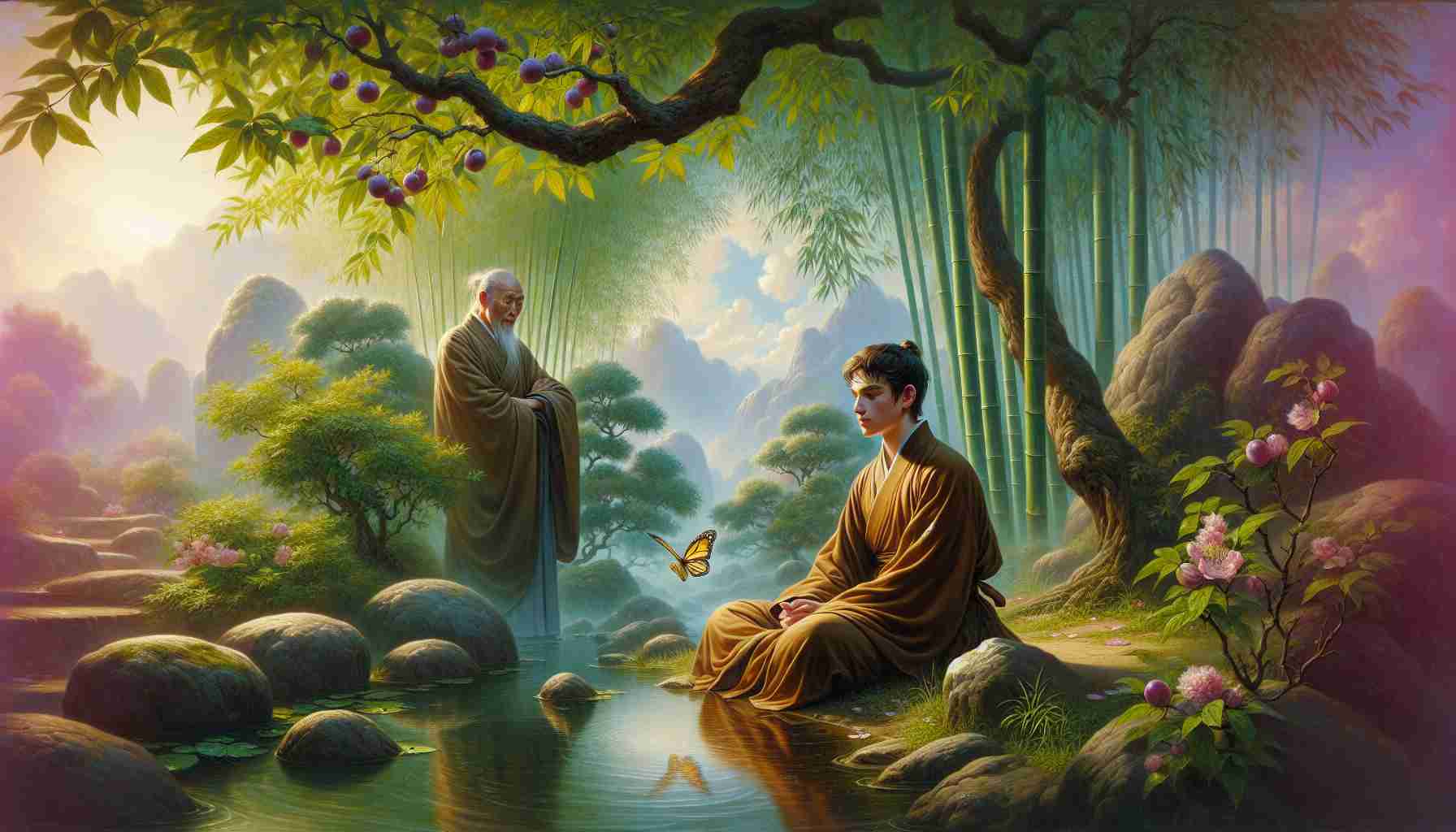

I didn’t know it then, but a butterfly would someday change the way I saw the world.
I was just seventeen, the youngest apprentice in the Temple of Quiet Winds, nestled under the tall bamboo trees near the mountain lake. I had come to the temple because I wanted to become wise—like the old monks who seemed calm even when storms shook the roof. But after months of sweeping floors and watering plants, I was growing restless. “When will I learn the secret of the Tao?” I grumbled one morning as I dragged my broom through the courtyard.
Master Fei, the oldest monk, was sitting under a plum tree, eyes half-closed, sipping tea. Without looking at me, he said softly, “Perhaps you already are.”
I frowned. That wasn’t the answer I wanted.
Later that day, as I sat by the pond in frustration, I saw something flutter by—soft and silent. A butterfly. It drifted here and there, never landing too long, never fighting the breeze.
“It just... floats,” I muttered aloud.
“That’s wu wei,” said a voice beside me. It was Master Fei again. “The butterfly does not push the wind. It dances with it.”
I blinked. “Wu wei? That’s the Taoist idea of ‘non-doing,’ right? But I thought that meant doing nothing.”
Master Fei smiled gently. “Not doing nothing. Doing without forcing. The butterfly moves, but with ease. The Tao is not about struggle—it’s about harmony.”
Still unsure, I walked back to the temple. But the next morning, I noticed more. The stream flowed gently, carving soft curves through the rocks. The grass did not try to grow—it just did. The sky never hurried, yet day always followed night. Everything happened in its own time.
Over the days, I stopped trying so hard to be wise. I just listened. I watched the world around me. I even began helping the garden grow, matching the pace of nature instead of forcing the soil. And slowly, a peaceful feeling grew inside me, like the breeze through the leaves.
One afternoon, Master Fei called me to sit beside him. “Do you know Zhuangzi’s dream?” he asked.
I shook my head.
“He once dreamed he was a butterfly, carefree and floating. When he awoke, he didn’t know if he had dreamed he was a butterfly... or if the butterfly was now dreaming it was him.”
I laughed. “That’s silly.”
“Or wise,” he said. “We’re not so different from that butterfly when we stop trying to control everything. We just are.”
And in that moment, I felt it—the Tao. Not something I had to learn or chase, but something I had been part of all along.
I still live at the temple. I still sweep the floors. But now, I watch the butterflies. And when the wind comes, I smile and let it carry me too.
The path of the Tao isn’t about trying harder. It’s about letting go. And sometimes, a soft-winged butterfly is the best teacher of all.
I didn’t know it then, but a butterfly would someday change the way I saw the world.
I was just seventeen, the youngest apprentice in the Temple of Quiet Winds, nestled under the tall bamboo trees near the mountain lake. I had come to the temple because I wanted to become wise—like the old monks who seemed calm even when storms shook the roof. But after months of sweeping floors and watering plants, I was growing restless. “When will I learn the secret of the Tao?” I grumbled one morning as I dragged my broom through the courtyard.
Master Fei, the oldest monk, was sitting under a plum tree, eyes half-closed, sipping tea. Without looking at me, he said softly, “Perhaps you already are.”
I frowned. That wasn’t the answer I wanted.
Later that day, as I sat by the pond in frustration, I saw something flutter by—soft and silent. A butterfly. It drifted here and there, never landing too long, never fighting the breeze.
“It just... floats,” I muttered aloud.
“That’s wu wei,” said a voice beside me. It was Master Fei again. “The butterfly does not push the wind. It dances with it.”
I blinked. “Wu wei? That’s the Taoist idea of ‘non-doing,’ right? But I thought that meant doing nothing.”
Master Fei smiled gently. “Not doing nothing. Doing without forcing. The butterfly moves, but with ease. The Tao is not about struggle—it’s about harmony.”
Still unsure, I walked back to the temple. But the next morning, I noticed more. The stream flowed gently, carving soft curves through the rocks. The grass did not try to grow—it just did. The sky never hurried, yet day always followed night. Everything happened in its own time.
Over the days, I stopped trying so hard to be wise. I just listened. I watched the world around me. I even began helping the garden grow, matching the pace of nature instead of forcing the soil. And slowly, a peaceful feeling grew inside me, like the breeze through the leaves.
One afternoon, Master Fei called me to sit beside him. “Do you know Zhuangzi’s dream?” he asked.
I shook my head.
“He once dreamed he was a butterfly, carefree and floating. When he awoke, he didn’t know if he had dreamed he was a butterfly... or if the butterfly was now dreaming it was him.”
I laughed. “That’s silly.”
“Or wise,” he said. “We’re not so different from that butterfly when we stop trying to control everything. We just are.”
And in that moment, I felt it—the Tao. Not something I had to learn or chase, but something I had been part of all along.
I still live at the temple. I still sweep the floors. But now, I watch the butterflies. And when the wind comes, I smile and let it carry me too.
The path of the Tao isn’t about trying harder. It’s about letting go. And sometimes, a soft-winged butterfly is the best teacher of all.